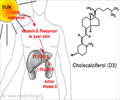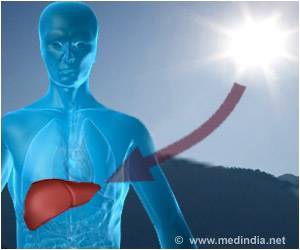A recent study from the journal Menopause suggests that vitamin D may be associated with a reduction in the levels of bad cholesterol. This could therefore benefit the heart.
Vitamin D is not merely a vitamin; it is more of a hormone. The effects of vitamin D in maintaining bones are well known. Vitamin D has also been used to prevent other conditions like psoriasis and certain cancers.A recent study found that the level of LDL was reduced in postmenopausal women who received daily supplements of vitamin D and calcium for a period of two years. LDL-cholesterol increases the thickness of blood vessels and reduces blood flow to the heart, which can precipitate a heart attack.
Though the study was relatively small, it points out to the possible benefits of vitamin D in protecting against heart disease. However, it must be remembered that excessive vitamin D can also be harmful and therefore should not be indiscriminately used.
Vitamin D Rich Foods
• Vitamin D can be formed by the skin when exposed to sunlight. In addition, several foods are rich in vitamin D. These include:
• Fatty fish like salmon and tuna and fish liver oil
• Mushrooms
Cholesterol Range
When you get a cholesterol test done, you will come across several values. Here is a rough guideline on how to interpret them:
Total cholesterol level: The level indicates the total cholesterol level in the blood. It should ideally be less than 200 mg/dL; a level of 240 mg/dL or higher is considered high.
LDL cholesterol level: The LDL cholesterol is notoriously related to heart disease. It should ideally be maintained at a level of less than 100 mg/dL and less than 70 mg/dL in people who are at a high risk or suffer from heart disease. A level of less than 130 mg/dL is acceptable in most patients.
VLDL cholesterol is also considered as a bad cholesterol, whose levels should be maintained between 5 and 40 mg/dL.
HDL cholesterol: While it is necessary to keep cholesterol levels low, there is one type of cholesterol - HDL cholesterol - which is good for the heart. Therefore, higher levels of HDL cholesterol are actually beneficial. Levels above 40 mg/dL in men and 50 mg/DL in women are considered desirable.
References:
1. Schnatz, Peter F. et al. Calcium/vitamin D supplementation, serum 25-hydroxyvitamin D concentrations, and cholesterol profiles in the Women's Health Initiative calcium/vitamin D randomized trial. Menopause doi: 10.1097/GME.0000000000000188.
2. http://ods.od.nih.gov/pdf/factsheets/VitaminD-HealthProfessional.pdf
3. http://www.nlm.nih.gov/medlineplus/ency/patientinstructions/000386.htm
Source-Medindia















